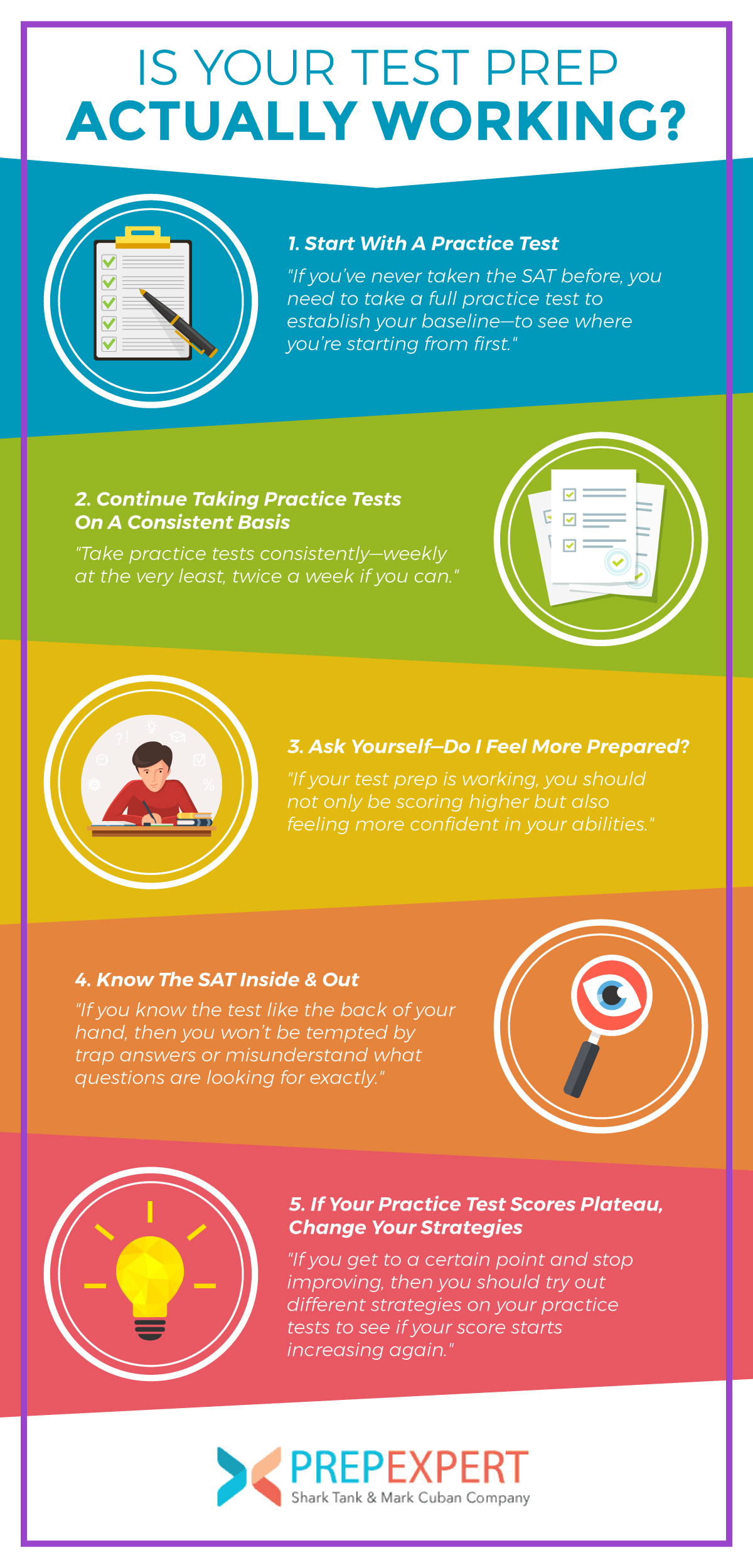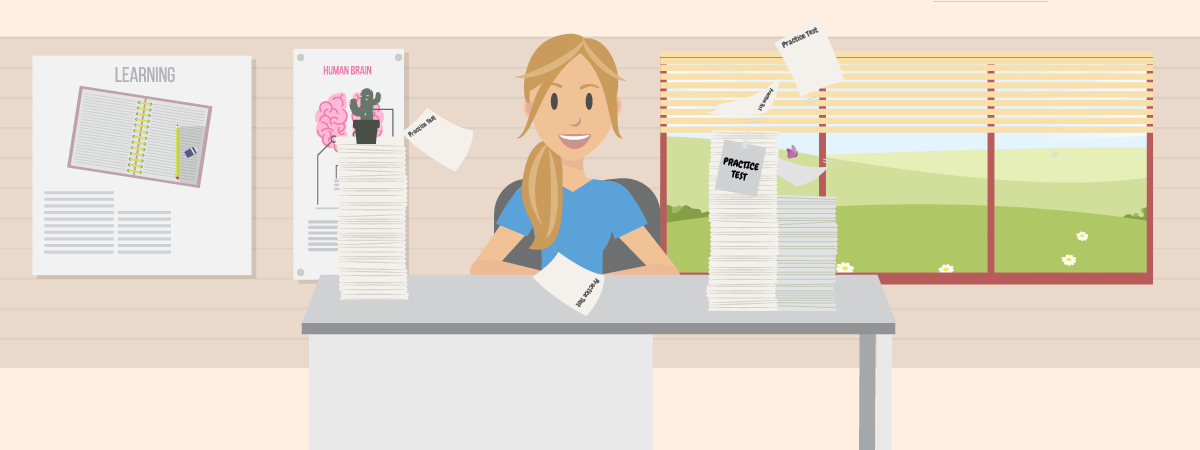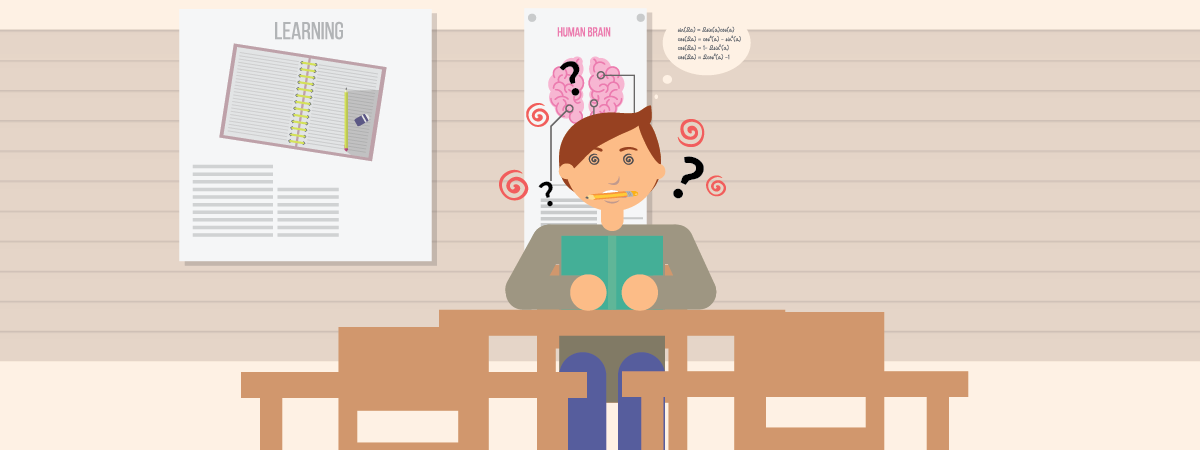Is Your Test Prep Actually Working?
You’ve put in lots of work, but you’re not sure if all of your studying for the SAT is paying off. Many students ask themselves, “is my test prep working?” Well, there’s no need to worry—there are a few ways to check if your test prep is actually working.
You can track your progress by taking plenty of timed practice tests under test-day conditions, then calculating your scores with each successive test—if your scores aren’t going up, then you’re doing something wrong.
More guidance is below. For some expert help with your test prep, consider taking an SAT prep course with Prep Expert®.


Start With A Practice Test
If you’ve never taken the SAT before, you need to take a full practice test to establish your baseline—in other words, to see where you’re starting from first.
Find a quiet place, free of distractions, set a timer, then tackle the Reading, Writing & Language, Math, and Essay sections in the same amount of time, and with the same number of breaks, that you would have on test day. Then, score yourself.
After you check your answers, you can use the scoring charts the College Board provides to see what you’d have gotten on a real SAT. Note this down.
Also, take notes on what types of questions you’re getting wrong. Did you struggle with questions about the literature passage on the Reading test? On questions about the comma on the Writing & Language test? Make a list of all your weak spots. Now, you have a study checklist.
Use this study checklist to tackle the content knowledge you need to acquire to eliminate your SAT blind spots. Spend a few hours reviewing your English textbook mastering the tone and literary technique you might need for the Reading test. Crack open your geometry book and re-learn the rules of right triangles and SOH-CAH-TOA for the Math test.
As you get a handle on each topic, cross it off your list.
[leadmagnet_five]
If you do this consistently, over time, you’ll find there’s not a single part of the SAT that you can’t figure out how to handle. But, this isn’t the entire length of the way you need to go to be ready for the test—or to track how you’re doing.

Continue Taking Practice Tests On A Consistent Basis
Take practice tests consistently—weekly at the very least, twice a week if you can.
To do well on the SAT, you need to learn not just subject knowledge, but also how to take the test. The more practice tests you take, the better you’ll be able to cope with each section’s rigorous time limits, and the more you’ll notice the types of questions and trick answer choices the test presents.
With each successive practice test, note down how many questions you got wrong, and use the scoring chart to see how you’d score on the SAT. Whether you’re studying for the whole test, or working on a specific section that you need to improve on, you’ll be able to use your practice test score—along with your baseline score or previous test score—to track the progress you’ve made so far.
If you’re studying well, you should see consistent improvement on the test. But, remember a couple of things…
The first is that, from one practice test to another, there’s bound to be some variation in how you do. Don’t panic or get discouraged if you end up going down a point or two at times. This is most likely due to the difference between different practice test versions.
Perhaps one particular test had Reading passages that were more difficult or less enjoyable for you to read, for example. Or, you could simply be having an off day. This is an ordinary part of the test prep process and is to be expected—don’t let it derail your studying.
The second thing to remember is, the better you do, the more difficult it will be to continue accruing points. There are only so many points on the SAT, and, at the highest score levels, the difference between a perfect score and a less-than-perfect score can boil down to getting or missing one measly question. For even the brightest and most hardworking students, completing a test perfectly, free of errors, is extremely tough.
Prepare yourself for that the fact that, no matter how much you study, there are likely to be one or two questions on the test where you’ll slip up or fail to notice something. Don’t be too hard on yourself over it, and don’t go crazy trying to fight something you can’t change. Any score over 1450 will put you in range for the most competitive Ivy League schools, so it’s not the end of the world if you don’t get a perfect 1600.

Ask Yourself—Do I Feel More Prepared?
If your test prep is working, you should not only be scoring higher but also feeling more confident in your abilities.
One of the SAT’s biggest challenges is fighting the inevitable test-day anxiety. This anxiety results in students getting lower scores on the actual test than they were getting on practice tests—sometimes by as many as 100 points. Feeling confident and knowing that you can do it are essential things to aim for in your test prep.
A particular area where boosting your confidence will come in handy is on the Math test. You should get to the point where you feel confident enough to do well even without your calculator. The equations and formulas at the start of the test and all your calculator’s handy functions are great resources to have on test day.
However, the confidence that comes from knowing a formula by heart, and being able to complete an inverse function without hitting a button, means you’re super prepared for the test and will feel confident on exam day.

Know The SAT Inside & Out
If you know the test like the back of your hand, then you won’t be tempted by trap answers or misunderstand what questions are looking for exactly.
Your test prep efforts are working well if you start to feel that you know the SAT inside and out. Can you anticipate exactly the types of questions you’ll see after you finish a Reading passage, and do you know how to rule out wrong answers?
Have you begun to notice the College Board’s favorite topics for history passages? Or the fact that, on the Writing & Language test, you’ll be required, at least twice, to know the difference between “its” and “it’s”?
[leadmagnet_two]
Do you have committed to memory the phrasing of questions—what it means when a question says “infer,” or when it says “according to”? Do you remember how drawing out a right triangle is almost always handy for area problems on the Math test? If so, then your test prep is working!
As I said before, test prep is not just about underlying content but also knowing how to take the test. Almost more than anything else in life, the SAT rewards hard work and consistent effort. So, take heart that what you’re doing—even if you’re only improving a point or two at a time—is paying off.

If Your Practice Test Scores Plateau, Change Your Strategies
If you get to a certain point and stop improving, then you should start trying out different strategies on your practice tests to see if your score starts to increase again—don’t give up studying.
You probably need to change your focus. Perhaps you’ve been zeroed in on learning underlying content, and you’ve maxed out what you need to learn. If so, then switch gears and focus on completing sections in time, or on picking apart questions to identify and rule out wrong answers.
As Ralph Waldo Emerson said, “A foolish consistency is the hobgoblin of little minds.” If doing things the same old way has stopped working, then switch it up!
If your score is still stagnating, then another possibility is that you’re getting fatigued. If you’re not bringing your all to your test prep study because you’re worn out or tired, then listen to your mind and body. Give yourself a break. Take a day or two off to relax or focus on other stuff.
But then, get right back to it. There’s a difference between taking a break and giving up! Of course, it’d be nice to take an entire week or month off test prep, but you don’t have that kind of time to spare—you can take your extended vacation after you get the score you’re aiming for!
There’s one last possibility—maybe you’ve worked really hard and you’ve reached a great score for you, but there’s not any more room for improvement. Not everyone is going to get 1600, so don’t go on a self-destructive, Captain Ahab-like quest for a perfect score if you’re not getting one with a reasonable amount of work.
For more test strategy, college admissions, and scholarship application tips sign up for our FREE class happening right now!
Written by Todd Marcus
More from Todd Marcus

Taking The ACT Junior Year
If you're ambitious and want to give yourself plenty of time for score improvement, then consider taking the ACT junior…

ACT 2020 Score Release Dates
Here then are the ACT 2020 score release dates to plan around, as well as, the different kinds of available…

How To Determine Your Average SAT Study Time
If you want a high score on the SAT, then you need to put in the hours. There's no way…